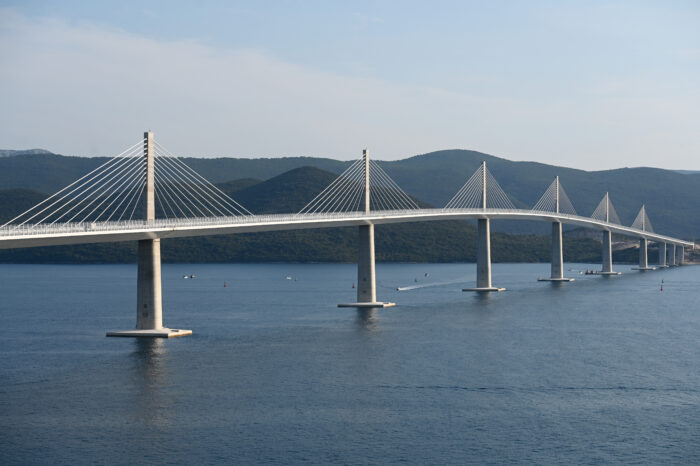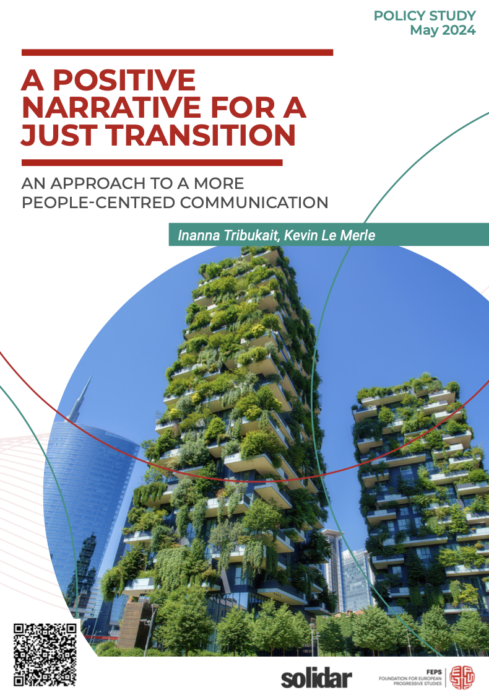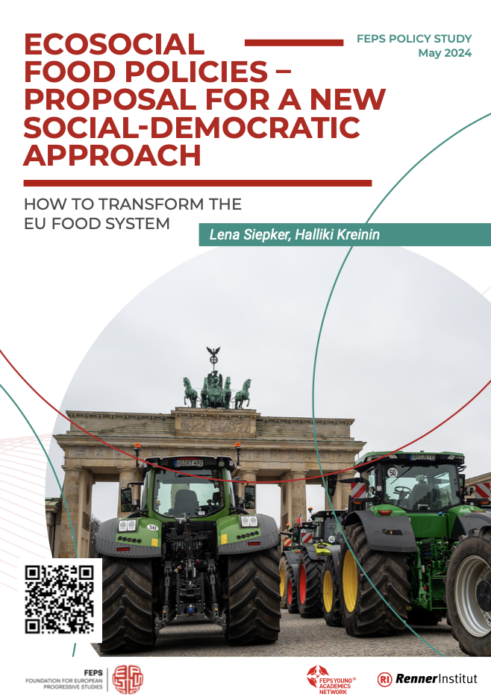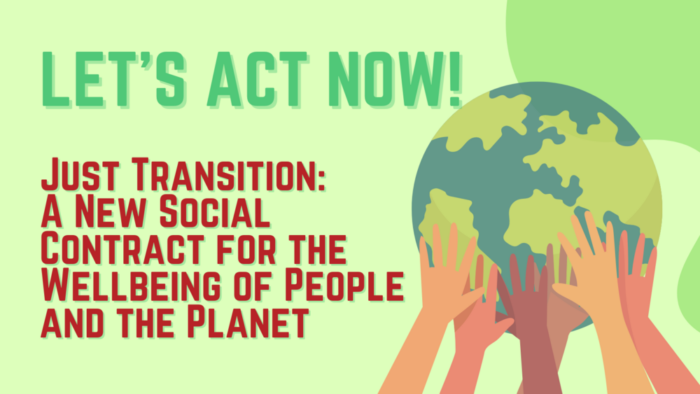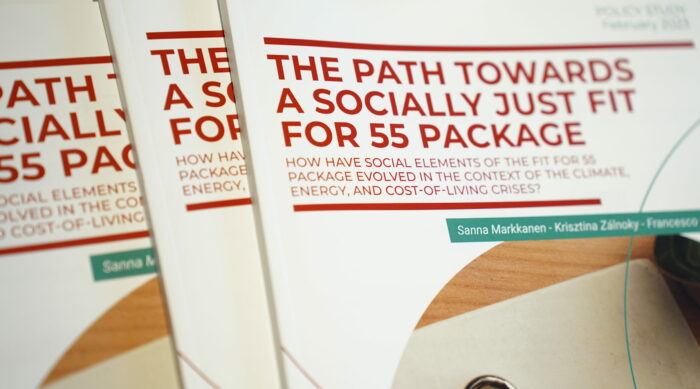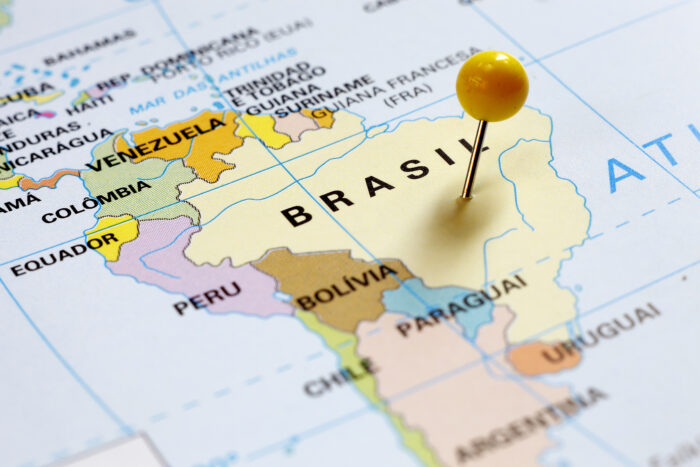Ahead of the 2019 climate summit in New York in September FEPS together with its partners set up a steering committee in order to be able to reflect on and test ideas of guiding proposals to be presented on this topic.
The group was chaired by Teresa Ribera, Minister for the ecological transition in Spain and brought together expert policy advisers, political representatives, civil society activists, academics and other key stakeholders in the climate justice debate.
This outcomes of this project were:
Policy Paper with Declaration and Guiding Proposals for Progressive Climate Action
Executive Summary with a foreword of FEPS Secretary General, László Andor.
The timeline of the project was:
10th -11th April - First meeting of the steering committee in Madrid
24th – 25th June - Second meeting in Brussels
20th - 21 st September - Third and final meeting with high-level side event open to the public in New York
FEPS counted with the support of the Fondation Jean-Jaurès, the Friedrich Ebert Stiftung New York office, Foundation Max van der Stoel, Fundación Pablo Iglesias and the Environment and Development Resource Centre (EDRC).
Project Background
Climate change is gaining more understanding and thus more prominence in worldwide debates. The Paris agreement brought international agreement to a clear objective. Since then the IPCC report published last autumn warned that there is a crucial twelve-year window of opportunity for action against global warming to be effective. Nevertheless influential actors still threaten to derail these agreements and negate the science of climate change.
In Europe we are witnessing social challenges in regards to climate change; the ‘gilets jaunes’ movement in France has brought about social unrest, based on inequalities but the introduction of a diesel tax was the catalyst. Indeed populists are now commandeering the issue and taking it off track; there is resistance to transition from declining industries such as coal, despite many people recognising that the industry is economically viable and is a major contributor to dangerously high levels of air pollution in cities. Many people in influential positions are already banking against climate issues, favouring a narrative of jobs and economy for today, climate later. Worryingly these political movements are expected to achieve a good result in the European elections, changing the political landscape in Brussels and the agenda setting of the Union which has always been a key actor in climate policy.
Internationally the current Presidents of the USA and Brazil are case examples illustrating already the extent of the destruction that is possible, when bypassing the objectives of the Paris agreement; all to the detriment of the most vulnerable in society and those least able to oppose the policies. Moreover they are also usually the ones who have contributed least to climate change. Another pertinent example is the drying up of Lake Chad. There is still no common climate strategy in the region of Lake Chad or policies of how to allocate the water in the region.
Interestingly the World Economic Forum in Davos again this year recognised that climate risk is a top issue however the response to address this is insufficient.
Climate change is affecting our biodiversity, weather patterns, agriculture etc and is increasing security issues. Droughts, forest fires and flooding are becoming more common and it is wreaking havoc on our societies and our natural environment.
As Secretary General Antonio Guterres expressed at the COP 24“Climate change is the defining issue of our time and now is the defining moment to do something about it.” People are suffering the consequences of climate change already and many are calling for urgent action. Progressives need to be prepared and offer sound policies.
Opportunity for Progressives:
Defending social justice, fighting inequalities and caring for our common well-being are traditional progressive values. Despite having a decent record of implementing climate policies on paper compared to other political movements[1], there is still a lot that progressives could have done and still choose not to. They need to do more if they are to ensure that they are the most credible and well-placed movement able to harness the right narrative and bring about effective change for people and planet.
Climate Justice therefore is a key endeavour of our times and progressives need to be leading on this issue, even more so against the current civil society backdrop which is calling for more and urgent climate action. Consequently Progressives should be setting the agenda on this, the opportunity is New York, this September 2019.
Therefore FEPS, as the Progressive European foundation will hold a high-level conference on the fringe of the United Nations General Assembly entitled “UNited for Climate Justice” on 20th September 2019. In order to prepare for this a reflection group or steering committee will be brought together which will help identify a guiding set of proposals to be presented there.
Climate Justice:
The concept of climate justice frames climate change as a political and ethical issue.
It recognises that environmental injustice stems from social and economic injustices within our societies. The fact that it is the most fragile and vulnerable, the most marginalised and disadvantaged who are affected most by climate change and the least able to deal with its consequences. Furthermore it considers climate change is further exacerbating already existing inequalities. The idea is to consider the fairness of this often disproportionate impact of climate change on different sectors of our societies in both developed and developing parts of the world. It acknowledges that sustainable choices are not accessible to all equally.
Existing data proves there is a direct link that disasters affect the most fragile states most of all and fragility affects where disasters happen. There are limitations to the current political responses to rising climate instability and the need for systemic change if we are to truly address the issue.
The meaning and definition of climate justice has various strands and interpretations, with two main approaches; the main difference being about who bears the responsibility of polluting, i.e. the ‘industrialised north’ and developed or newly-developed countries, contrasting with who are the victims, i.e. the poor ‘global south’. Then the questions about burden-sharing, prevention and having effective capacities to adapt come into play. Whether the burden should be equal or whether a higher amount of responsibility should be accepted by those parties who have polluted more and are better equipped to deal with the challenges and whether they should provide more to help the global south to be better adapted.
There is also of course a legal element to this debate about legal justice and litigation on climate-related issues. This is something that is gaining much more ground in recent years with some positive examples and developments in the legal arena.
Whilst acknowledging these varying strands of climate justice theory this initiative will mainly focus on how to bring about key changes that will raise ambition, financing and help create long-term, solid and holistic ambition, this in responsibility-bearing states but also by empowering and enabling more capacities in an equal manner globally.
Focus of the initiative:
The substance of this initiative aims to bring about fresh-thinking into the core of this debate. The fundamental objective is to create a sound narrative of raising notably political ambition on climate action. The approach should be holistic and global-orientated with key policy proposals and guidelines as the output. It should be above-all, forward-looking. Yet it also needs to answer to the urgency of the current situation. Viable policies and alternatives should be brought forward and tested.
As a progressive political foundation FEPS can offer a space that enables different stakeholders to come together; academics, policy experts with civil society, political representatives and other various stakeholders.
The discussions should consider commitment and accountability, political leadership where momentum can come from, how to move from analysis to action and how to ensure sustained leadership. How to avoid talking and acting in silos and move to a multi-disciplinary approach and how to share the knowledge in a multidisciplinary approach. Having in mind that this is not intended to be about duplication or about creating new tools, it is about enhancing existing ones and using them better.
The summit itself will play a big role in keeping momentum alive; scaling-up ambition and continuing to work together to stop the climate issue being derailed. There will be some importance given to speaking with a common voice, with a common plan forward on the international stage in New York. Climate security may also be a large part of the discussions but it’s not yet clear what place it will have on the agenda at the September summit.
Initiative framework:
With the support of Secretary General of the United Nations, Antonio Guterres FEPS was advised to set up an annual fringe event in the framework of the UN General Assembly, which takes place annually in New York in September. FEPS carried out its first initiative of this kind last year, 2018 and the topic was on migration. The steering committee and the proposals gave successful output in helping ensure the migration compact came about. This year and especially considering there will be an extraordinary summit for climate change on the 23rd September, FEPS decided to hold its annual UN fringe conference on the topic of climate change. The title will be “UNited for Climate Justice”. This will be done with the support of several partners; the Friedrich Ebert Stiftung New York, the Fondation Jean-Jaurès, Foundation Max van der Stoel, fundación Pablo Iglesias and the Environment and Development Resource Centre (EDRC).
[1] Prof. R Ladrech, 2017 https://www.feps-europe.eu/Assets/Publications/PostFiles/466_1.pdf



